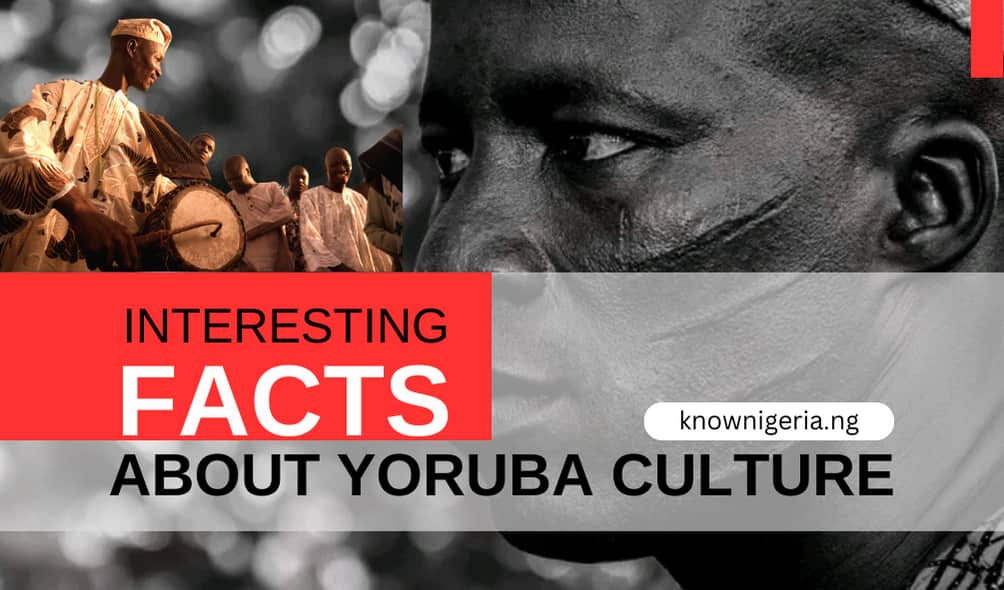Yoruba is so rich in history and culture, from those that are factually correct to those that have been disproven and those that we just will never know. If you’re interested in studying the Yoruba people, you’ll keep coming across interesting facts about Yoruba culture that will have you seeking more.
In this article, we’ll try to show you some of the most interesting facts about Yoruba culture through narrations about the Yoruba people. Also, consider sticking to the end; I might just throw in a few trivia-style facts about Yoruba culture you certainly wouldn’t want to miss.
Table of Contents
Yoruba History and Culture
The term ‘Yoruba’ can be used to refer to an ethnic group consisting of around 52 million people predominantly domiciled in the West African countries of Nigeria, Benin, and Togo. In addition to the African-based Yoruba population, there’s also a cross-section of Yoruba outside the continent, with estimates putting their number at one million.
ALSO READ: Beautiful Yoruba Tribal Marks and Their Unique Meanings
Yoruba people are highly artistic, with weaving, textile production, tie and dye, pottery, and mask making being common trade ventures among members of the ethnic group. Times are changing, and this isn’t completely true anymore, but a glance at any creative industry in Nigeria will show excellent Yoruba stakeholders, which is one of the interesting facts about Yoruba culture.
The origin of the Yoruba people depends on who you’re asking and what you choose to believe. A common consensus among members of the Yoruba community is the Obatala theory of creation which suggested that the Yoruba deity of creation (Obatala) created the earth by pouring sand from a snail shell onto the water and marshland that originally populated the earth.
What happened after is more unambiguous; we know Fulanis conquered some parts of the Yoruba empire, explaining the spread of Islam to the region. We also understand that the British came later to colonize and eventually amalgamate Southern and Northern Nigeria before handing us our freedom in 1960.
One of the most interesting facts about Yoruba culture and history is that most aspects of it originated from us; you can hardly find any overlap between the Yoruba culture and that of either the Fulanis or the British, despite being a colony of both at different crucial periods in the ethnic group’s history.
Interesting Facts About Yoruba Culture
The Yoruba culture is one of the most interesting in Nigeria, and perhaps worldwide. While there are so many facts about Yoruba culture to learn, dividing this article into sections that explain certain aspects of the culture would be a better and more interesting approach to this topic.
So, this is probably not what you’re expecting, but here’s a breakdown of different aspects of the way of life of the Yoruba people, including many interesting facts about the Yoruba culture.
1. Yoruba Religion

The religion of the Yoruba people (or Isese in Yoruba) isn’t a single religion in the traditional sense. Rather, it’s a collection of spiritual and religious beliefs with links to each other common among different cross-sections of the Yoruba population.
Isese is a hierarchical and largely polytheistic belief system with different deities that seem to report to a supreme being known as Olodumare. Olodumare is not gender-constrained; adherents of Isese typically refer to Olodumare as ‘they,’ a term children also use to refer to seniors in the Yoruba language.
While the Olodumare is the source of all creation and life energy, mortals don’t typically interact directly with them, and that’s where the Orishas come in. Orishas are deities that serve as intermediaries between humans and the Olodumare, and they typically possess extreme but specialized power.
For example, the deity Sango is believed to be the god of lightning; Ogun, the god of iron and fire; and Aje, the goddess of wealth, among others. As you may have noticed, the deities are gender-constrained and are not referred to as ‘they’ like Olodumare, despite their superpowers.
Unlike Abrahamic religions with a concept of heaven and hell, the Yoruba religion leans more towards incarnation. The belief in incarnation is evident among other aspects of the Yoruba culture, like the names Babatunde (father returns) and Yetunde (mother returns), which both imply that dead relatives return upon the birth of another child.
Today, most Yorubas worldwide have dropped their belief in the Yoruba traditional religion, or Isese, with the entire population almost equally divided into the Islamic and Christian religions. However, there are still some strict adherents of Isese, but they’re frankly in the fringe minority and dying out.
2. Yoruba Culture of Twins

Twins are an essential part of the Yoruba culture. They have to be, as the ethnic group boasts of the highest rate of twin births worldwide. The local name for twins in the Yoruba language is ‘Ibeji,’ but Ibeji is interestingly also the name of the Orisha representing twins.
The first-born child between a pair of twins automatically inherits the name Taiwo, while the second is Kehinde. This naming convention is a result of a belief that the second one (Kehinde) is older. The reason Kehinde came later was because they sent their younger brother (Taiwo) to ‘taste the world,’ which translates to Taiwo in Yoruba.
Isese adherents believe you’re expected to make a wooden replacement if one of the twins dies to prevent the other from dying as well. The replacement is treated exactly like a live child and they’re never to refer to the dead one as ‘dead.’
Most spiritual beliefs surrounding twins in Yoruba mythology are slowly dying out, but the prevalence of twins and the belief in the good fortune they bring remain.
3. Yoruba Culture of Omoluabi (Good Character/Respect)
Outsiders have always referred to the Yoruba culture of respect as ‘obsessive,’ as the Yoruba-speaking people of South-West Nigeria are probably the most respectful in the world. The Yoruba philosophy of respect and good character is referred to as ‘Omoluabi,’ which translates roughly to ‘Child begotten by the deity of good character.’
Unlike in other parts of the world, respect in Yorubaland is earned automatically with age, regardless of an individual’s level of knowledge or socioeconomic status in society. The expectations of respect from the average Yoruba child are so high that it’s almost unlearnable if you’re not a native of the tribe.
For one, young people in the Yoruba culture aren’t allowed to refer to their elders by their names, as it’s deemed disrespectful. Rather, you refer to them with a term that denotes their level of seniority to you. For instance, you refer to your parents as Mama mi and Baba mi; your elder siblings are Egbon mi (no real translation to English), and so on.
Also, you don’t use regular pronouns for those older than you for similar reasons. Since the Yoruba language uses gender-neutral pronouns, the convention is to refer to your younger ones using singular personal pronouns and your elders by plural personal pronouns.
In short, “they (a group of young boys) are playing football” and “he (your dad) is playing football” translates to the same thing in the Yoruba language; isn’t that interesting?
Another aspect of the Yoruba omoluabi culture of respect is greeting elders. In the Yoruba culture, boys are expected to prostrate fully when greeting elders, while girls kneel. Greeting your parents or other elderly persons without kneeling or prostrating (as the case may be) is regarded as disrespect to them in the Yoruba culture.
Other aspects of the omoluabi culture include honesty, impeccable character, humility, bravery, hard work, and excellence.
4. Yoruba Political Structure
Yoruba people of the pre-colonial era practiced a loosely decentralized political structure in a unified system that simplified governance for the head of government. While the structure exists to this day, it’s no longer as potent as it was back then, as traditional leaders have ceded most of their powers to democratically elected governors and presidents.
Back then, there were kingdoms consisting of smaller towns and villages with one important one as the headquarters. These towns and villages have leaders called Baales who report to the king. The king or Oba sits at the top of the administration, acting as the Baale of the headquarters and exerting control over the Baales of the smaller villages.
However, both the Oba and the Baales have chiefs to help them oversee the affairs of their respective villages. To show subordination and respect to the king, Baales typically pay ‘Isakole’ (homage) in money or farm produce to the king.
Baales can be removed and replaced at the Oba’s sole discretion. On the other hand, kings are typically selected on a rotational hereditary system. A select few households produce kings in turns, and when a king dies from one household, the next in line produces the next one in a rotational format.
While most Yoruba kingdoms have measures in place to checkmate the Oba and possibly impeach him if need be, it rarely happens, partly due to the level of power kings had at the time. Despite the Oba’s dictator-like powers, the decentralized system of Baales and Chiefs helped keep Yoruba kingdoms in order, as the chiefs fought to retain their position and influence in the land.
Random Facts About Yoruba Culture
We’ve looked at many facts about Yoruba culture in a general sense, but this article will not be truly complete without trivia-style catchy interesting facts about Yoruba culture you can use to wow your friends.
With that said, here are five interesting facts about Yoruba culture and history you should know, whether as a member of the ethnic group or as an outsider.
- Children shouldn’t use proverbs without permission when speaking to elders in the Yoruba culture.
- Ife is widely regarded as the spiritual homeland of the Yoruba people. It was believed to be the city where Obatala settled after creating land.
- The Yoruba people mark significant events with celebrations and festivals. There are about 15 principal celebrations in the Yoruba culture, including naming ceremonies, coronations, wedding ceremonies, funerals, harvests, housewarming, etc.
- The Yoruba people didn’t always use a seven-day week. The Yoruba week consists of four days: Ojo Ogun, Ojo Jakuta, Ojo Ose, and Ojo Awo.
- Babies in Yoruba have natural birth names (Oruko amutorunwa) based on how they were born. A notable example is twins: recall that the first child among twins is always Taiwo, and the second is Kehinde. There’s one such name for almost every baby!
Conclusion
If you feel like you’ve learned a lot already, this is just the tip of the iceberg. There are many more interesting facts about Yoruba culture to learn, but with what you’ve known, you can easily surprise your non-Yoruba friends, and even some of the Yoruba ones.
If you like our content, we know you would love our excellent content on our Youtube channel, Tiktok, Facebook, Instagram, and Twitter. Please subscribe and follow us for more Premium Know Nigeria content.










